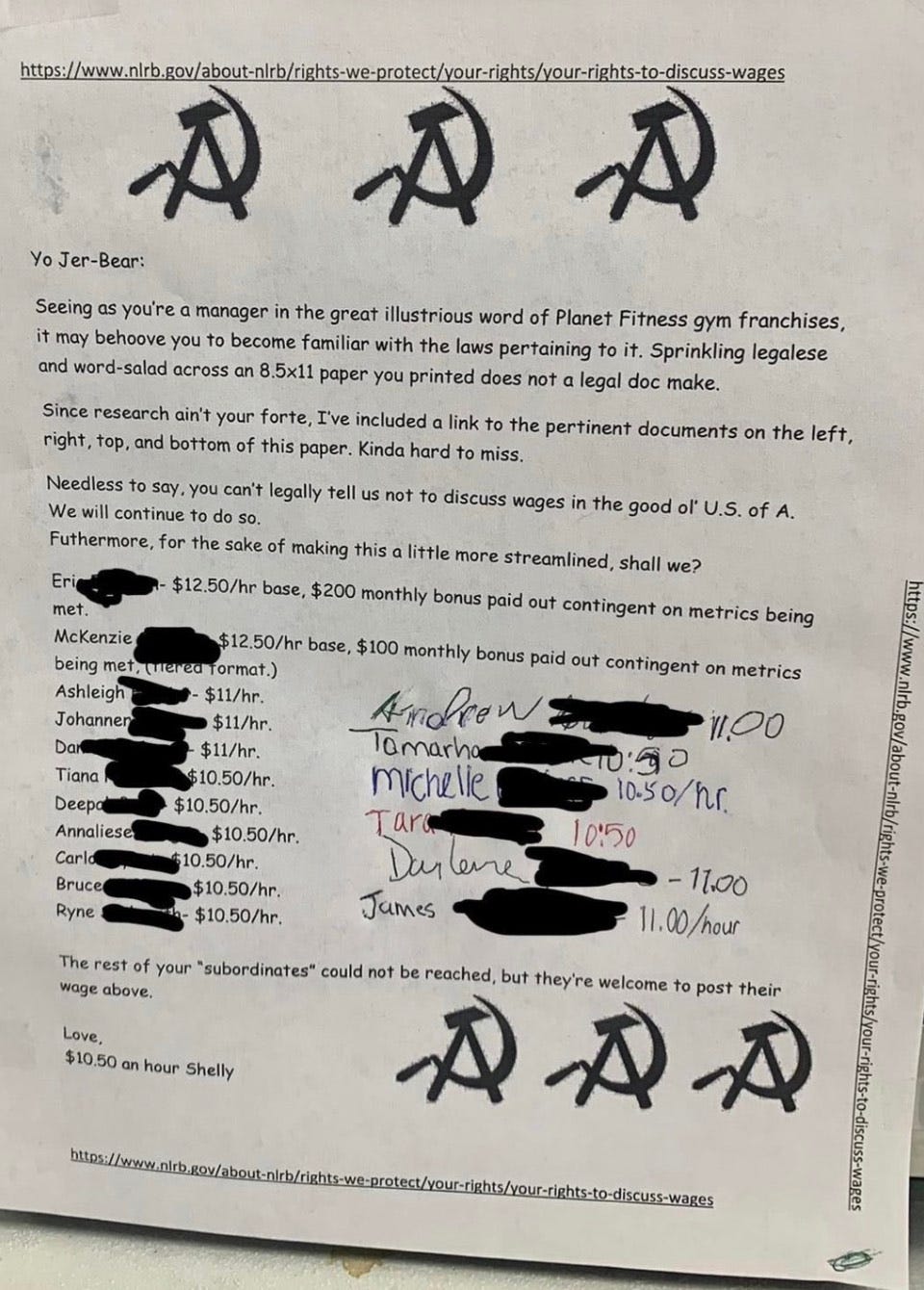Jer Gets 'Schooled' On Protected Concerted Activity: An example of what NOT to do
Or, alternatively..."You have to see it to believe it."
Jer, “employment at will” doesn’t mean what you think it means.
Some background. A lot of employers (and employees) have a fundamental misunderstanding of what “employment at will” means.
As it applies to employees, employment at will basically means that employees can quit their job at any time, for any reason.
For employers, however, the phrase employment at will is altogether different.
“While it is the same phrase as for employees, how it plays out is entirely different,” writes Suzanne Lucas (aka Evil HR Lady). “Employers can fire a person for any reason or no reason as long as that reason isn't prohibited by law.”
What is protected concerted activity?
There are many laws that protect employees in the workplace—at the municipal, state and federal level.
One of those federal laws that has been around a really, really long time—since 1935, in fact—is the National Labor Relations Act, which is administered by the National Labor Relations Board (NLRB).
Within this federal law, it gives private-sector employees in nearly every private-sector workplace (except airlines and railroads, which is a different federal law) Section Seven rights.
It is important to note that these rights apply to employees union unionized workplaces and, as importantly, non-unionized workplaces.
As part of employees’ Section Seven rights, employees have a federally-protected right to engage in Concerted Activity, which the NLRB explains (in part) to workers as follows:
You have the right to act with co-workers to address work-related issues in many ways. Examples include: talking with one or more co-workers about your wages and benefits or other working conditions, circulating a petition asking for better hours, participating in a concerted refusal to work in unsafe conditions, openly talking about your pay and benefits, and joining with co-workers to talk directly to your employer, to a government agency, or to the media about problems in your workplace. Your employer cannot discharge, discipline, or threaten you for, or coercively question you about, this "protected concerted" activity. [Emphasis added.]
This brings us to ‘Jer’…
Somewhere in Kentucky, there is a Planet Fitness that, apparently, employs a manager named ‘Jer.’
Well, according to a since deleted Reddit post, a couple of weeks ago, ‘Jer’ decided to lecture his ‘subordinates’ about their discussing their wages.
Unfortunately, Jer must’ve fallen asleep during the management training about employee rights because, as noted above, co-workers do have a legally-protected right to talk about “wages and benefits or other working conditions.”
In fact, the NLRB even has a page entitled “Your Right to Discuss Wages” to let employees know they have the right to talk about their wages, which states (in part):
You may have discussions about wages when not at work, when you are on break, and even during work if employees are permitted to have other non-work conversations. You have these rights whether or not you are represented by a union.
Protected conversations about wages may take on many forms, including having conversations about how much you and your colleagues and managers make, presenting joint requests concerning pay to your employer; organizing a union to raise your wages; approaching an outside union for help in bargaining with your employer over pay; and approaching the National Labor Relations Board for more information on your rights under the NLRA.
The uneducated Jer gets ‘schooled’ by his “subordinates”
Well, as you can imagine, if they weren’t educated about their Section Seven rights before Jer posted his memo, Jer’s “subordinates” quickly became educated (perhaps, thanks to the Reddit thread), for this was his subordinates’ response:
[Note: The ‘subordinates’ response has also since been deleted by the person who posted it…with an explanation.]
Although, through a search of the NLRB’s website, it does not appear there has been any unfair labor practice charges filed against Jer or his employer, that does not mean it won’t occur at some point in the future.
The moral of the story.
In the private sector, nearly every employee (union and non-union) has the right to engage “protected concerted activity.” Protected concerted activity includes employees being able to freely talk about their “wages and benefits or other working conditions.”
Prohibiting, retaliating, or threatening to retaliate against employees for engaging in protected concerted activity—including talking about their wages—is likely to be considered unlawful (an unfair labor practice) by the National Labor Relations Board.
Don’t be a ‘Jer.’






